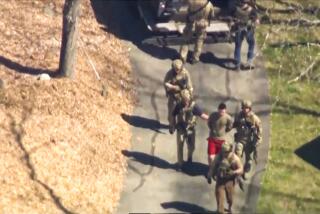NATO Is Quick to Deny BBC Report of a Spy in Alliance’s Ranks During Kosovo War
- Share via
LONDON — A spy within NATO leaked details of allied bombing raids to the Yugoslav government during the first two weeks of last year’s military campaign against President Slobodan Milosevic, a BBC television documentary reports, citing a U.S. Air Force investigation.
NATO, U.S. and British officials immediately denied the report, a preview of which appeared in Thursday’s edition of the Guardian newspaper and on the BBC Web site, https://www.bbc.co.uk.
The documentary, which will air Sunday on the BBC, asserts that an Air Force investigation found that the Yugoslav government was given highly sensitive “air tasking orders,” including the targets to be hit, flight paths and the timing of surveillance flights and bombing sorties.
When the alliance’s military commander, U.S. Gen. Wesley K. Clark, ordered that the number of people allowed to see the air tasking orders be reduced--from about 600 to about 100--the impact on the Serbs’ knowledge “was immediate,” the Air Force reportedly learned.
Clark didn’t comment directly about the reported investigation. In the documentary, viewed by the Los Angeles Times, he said, “In some cases, we had some indication maybe they did have some information about specific things that were being targeted.
“We looked for all indicators that the Serbs might have known what we were doing, and we worked these back into what else we could do to tighten operational security.”
In the Guardian article, co-written by the reporter for the BBC documentary, Clark is quoted as saying there was “absolutely not” a spy at North Atlantic Treaty Organization headquarters in Brussels. Asked, however, if there was a spy “in NATO,” he said, “I don’t think so.”
Those responses didn’t appear in the documentary about the bombing campaign, which NATO launched after Milosevic’s crackdown on ethnic Albanians in the separatist province of Kosovo.
If the leaks did take place, it means that the Serbs would have been able to move into and around Kosovo without detection by reconnaissance planes--avoiding the aircraft’s paths--and could have moved soldiers and equipment out of harm’s way when they knew air attacks were imminent.
A high-ranking European diplomat at NATO said that, if there had been a leak, it would not have been from alliance headquarters in Brussels but from the alliance members’ military commands because information about the strike targets “never got to Brussels.”
U.S. and European officials at NATO said they were unaware of an Air Force investigation, and NATO spokesman Jamie Shea called the BBC report “a bit flimsy,” although he did acknowledge that NATO had changed its procedures two weeks after the war began March 24 to restrict access to information about operations.
“Would the Pentagon have a top-secret report on a mole or spy in NATO, sit on it for a year and then tell the BBC about it instead of NATO or the member governments?” Shea said. “The air campaign has been over for a year. If there was such a compromise of NATO operations, how come the head of security here--who is an American, incidentally--has never heard of it?”
Shea nonetheless acknowledged that, “two weeks into the campaign, the target access list was cut back from 600 to 100. These kinds of things were not done because anyone had evidence of a spy. It was through ordinary prudence, ordinary care.”
But reports of a previous leak turned out to be true. In November 1998--almost five months before the air war started--a senior French officer, Pierre-Henri Bunel, admitted that he had slipped NATO’s overall target plans to a Yugoslav diplomat based in Brussels.
Bunel was arrested and detained in Paris by the French, who assured their allies that they had dealt with the affair quickly and effectively.
There had also been speculation about a possible second leak. In April, London’s Daily Telegraph newspaper quoted a Western military source as saying that Washington was “cutting Paris out of the loop on some [NATO] operations” out of fear that information was finding its way to Belgrade, the Yugoslav capital. The same month, Germany’s Sueddeutsche Zeitung reported that NATO had begun hunting for a mole.
In August, defense expert Paul Beaver wrote in the Scotsman newspaper in Edinburgh that senior NATO sources had confirmed that information leaked to Belgrade was used by the Serbs to intercept and shoot down an F-117A Stealth fighter in the first few days of the air war.
Clark is quoted in the Scotsman as saying that “it apparently happened. I can’t go into details.”
Beaver, an analyst for Jane’s Defense Weekly, said in a telephone interview from Kuwait that his source “was not the American document. This is yet another source.”
He said the downing of the U.S. jet had “all the hallmarks of someone either purposely or negligently supplying information to the Serbs.”
Miller reported from London and Dahlburg from Paris.
More to Read
Sign up for Essential California
The most important California stories and recommendations in your inbox every morning.
You may occasionally receive promotional content from the Los Angeles Times.













